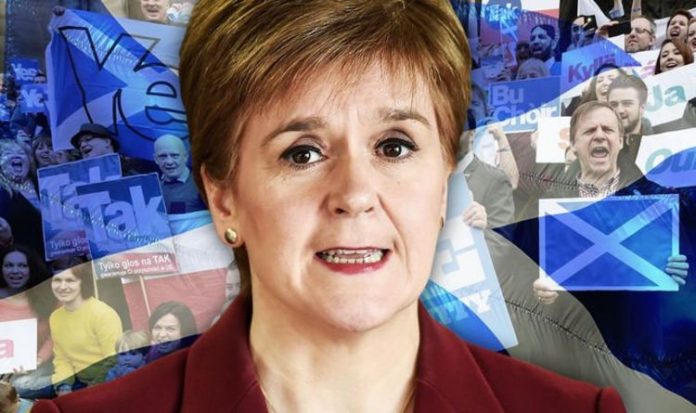Polls published recently offered encouragement to the First Minister as they showed a huge boost in support for Scottish independence. The survey by Panelbase showed 55 percent in favour of breaking with the union, with 45 percent against – an exact reversal of the 2014 referendum result. The SNP is reviving its push for a second independence referendum, as Ms Sturgeon pledged to publish draft legislation for a new vote before next May’s elections for the parliament in Edinburgh. However, despite the momentum behind the SNP’s independence charge, one poll from October 2019 could come back to haunt Ms Sturgeon.
The poll found that in a second independence referendum, undecided voters were more likely to think a split from the UK would be good for the Scottish economy in the long run (35 percent to 19 percent).
However, when these voters were asked what the three most important issues were for deciding how to vote in a next referendum, 34 percent replied with the state of the economy.
While Ms Sturgeon has tried to make the economic case for independence, statistics published last week could cause many in Scotland to get cold feet over independence.
The latest Government Expenditure and Revenue Scotland analysis of the health of the economy, has shown that the Scottish “notional deficit” stands at 8.6 percent – £15.1billion – compared to 2.5 percent for the UK as a whole.
This is up by around £2billion from the previous year, and does not factor the remaining impact of the coronavirus crisis.
The report also shows that despite rising tax revenues overall, Scotland’s public sector take is £12,058 per person, £308 less than the UK average.
Meanwhile, expenditure levels mean that on average, spending per person in Scotland is £1644 higher than on those living elsewhere in the UK.
Professor David Jeffery said in his CapX column this week that the figures “will be used heavily by unionists to firm up their support and to convince waivers”.
READ MORE: Nicola Sturgeon’s IndyRef2 hopes dashed as ‘polls won’t secure vote’
However, the new Scottish Conservative leader, Douglas Ross, accused the First Minister of existing in a “Holyrood bubble”.
He said: “This was the moment where the First Minister could have put selfish, narrow interests to one side and united the country.
“Instead, we’re told the solution is another referendum bill, only this time in the middle of a pandemic.
“The First Minister just doesn’t get it. She needs to leave the Holyrood bubble and get back into the real world, where people are fearful of losing their jobs.”







